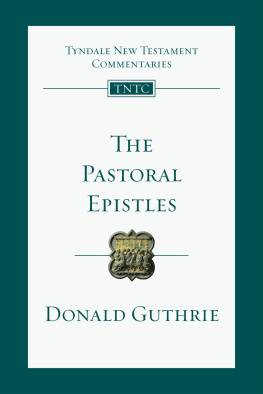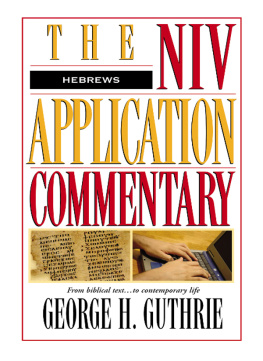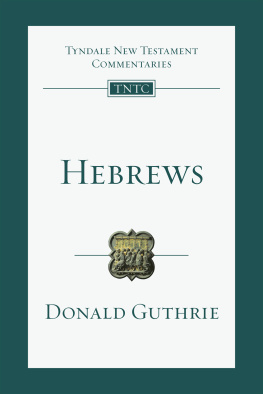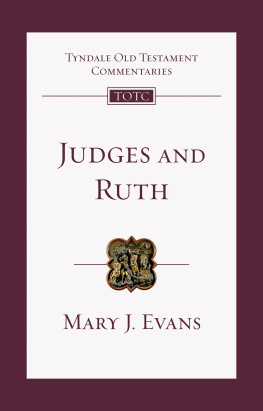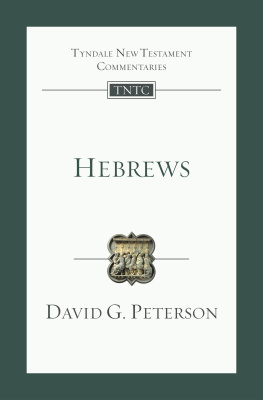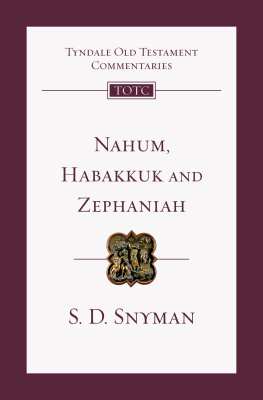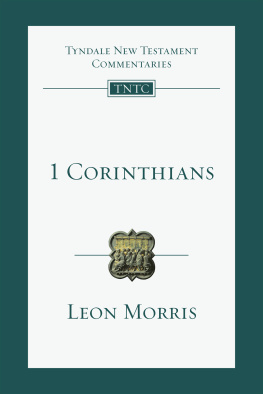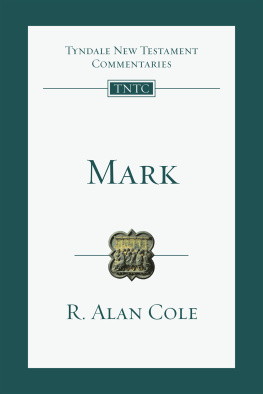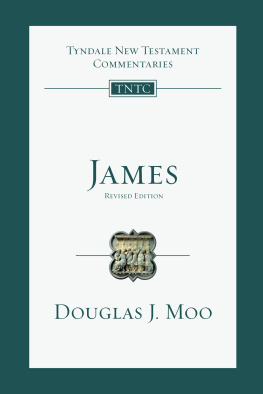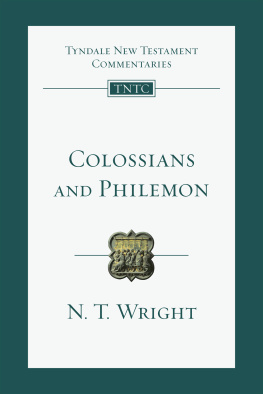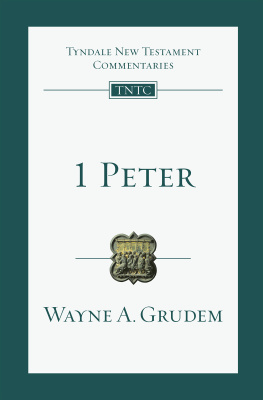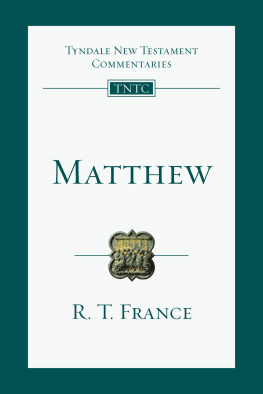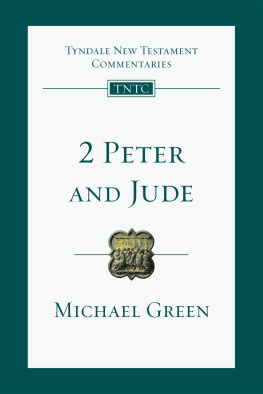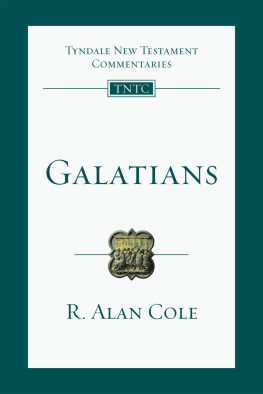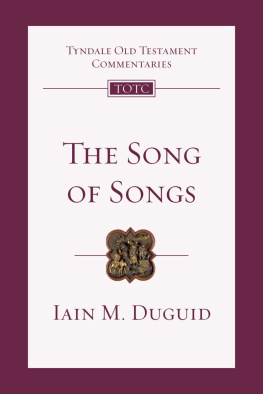TYNDALE NEW TESTAMENT
COMMENTARIES
VOLUME 14
THE PASTORAL EPISTLES
Inter Varsity Press, USA
P.O. Box 1400
Downers Grove, IL 60515-1426, USA
World Wide Web: www.ivpress.com
Email:
Donald Guthrie 1990
All rights reserved. No part of this publication may be reproduced, stored in a retrieval system or transmitted in any form or by any means, electronic, mechanical, photocopying, recording or otherwise, without the prior permission of Inter-Varsity Press.
InterVarsity Press, USA, is the book-publishing division of InterVarsity Christian Fellowship/USAand a member movement of the International Fellowship of Evangelical Students.
Unless otherwise stated, Scripture quotations are taken from the Holy Bible, New International Version. Copyright 1973, 1978, 1984 by International Bible Society. Used by permission of Hodder & Stoughton, a division of Hodder Headline Ltd. All rights reserved. NIV is a trademark of International Bible Society. UK trademark number 1448790.
First published 1957
Second edition 1990
ISBN 978-0-8308-9491-8 (digital)
ISBN 978-0-8308-4244-5 (print)
This digital document has been produced by Nord Compo.
TYNDALE NEW TESTAMENT
COMMENTARIES
VOLUME 14
GENERAL EDITOR LEON MORRIS
THE PASTORAL EPISTLES
AN INTRODUCTION AND COMMENTARY
DONALD GUTHRIE
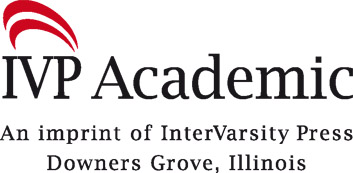
General preface
The original Tyndale Commentaries aimed at providing help for the general reader of the Bible. They concentrated on the meaning of the text without going into scholarly technicalities. They sought to avoid the extremes of being unduly technical or unhelpfully brief . Most who have used the books agree that there has been a fair measure of success in reaching that aim.
Times, however, change. A series that has served so well for so long is perhaps not quite as relevant as when it was first launched. New knowledge has come to light. The discussion of critical questions has moved on. Bible-reading habits have changed. When the original series was commenced it could be presumed that most readers used the Authorized Version and one could make ones comments accordingly, but this situation no longer obtains.
The decision to revise and update the whole series was not reached lightly, but in the end it was thought that this is what is required in the present situation. There are new needs, and they will be better served by new books or by a thorough updating of the old books. The aims of the original series remain. The new commentaries are neither minuscule nor unduly long. They are exegetical rather than homiletic. They do not discuss all the critical questions, but none is written without an awareness of the problems that engage the attention of New Testament scholars. Where it is felt that formal consideration should be given to such questions, they are discussed in the Introduction and sometimes in Additional notes.
But the main thrust of these commentaries is not critical. These books are written to help the non-technical reader to understand the Bible better. They do not presume a knowledge of Greek, and all Greek words discussed are transliterated; but the authors have the Greek text before them and their comments are made on the basis of the originals. The authors are free to choose their own modern translation, but are asked to bear in mind the variety of translations in current use.
The new series of Tyndale Commentaries goes forth, as the former series did, in the hope that God will graciously use these books to help the general reader to understand as fully and clearly as possible the meaning of the New Testament.
Leon Morris
Authors preface to the first edition
The Pastoral Epistles have played an important part in the history of the Christian church and have amply justified their inclusion in the New Testament Canon. Their appeal lies in their blend of sound practical advice and theological statement, which has proved invaluable to Christians both personally and collectively. It is not surprising that the injunctions directed to Timothy and Titus regarding their responsibilities have served as a pattern for the Christian ministry, and have been used so widely in services of ordination.
I have been conscious of many difficulties in approaching my task of commenting upon these letters. Over a considerable period serious doubts have been cast upon their authenticity by many scholars and this has tended to decrease their authority. I have felt obliged to make a thorough investigation of these objections, and the results are given as fully as space will permit in the Introduction. A special examination has been made of the linguistic problem. Because of the technical nature of this study, the conclusions reached are given in an Appendix.
It is impossible to acknowledge indebtedness separately to all those writers who have preceded me in this field and who have contributed to my understanding of these Epistles. There are some, however, who must be singled out for special mention. Among those commentators who have maintained Pauline authorship, Bernard, Lock, Spicq and Simpson have been specially helpful, while Newport White, Horton, Parry and Jeremias have furnished many useful suggestions. On the other hand, Scott and Easton, who do not favour Pauline authorship, have been constantly consulted, and Dibelius has proved valuable for literary parallels. Harrisons book on The Problem of the Pastorals has been indispensable in dealing with the linguistic problem and forms the basis of the investigations given in the Appendix.
It is my sincere hope that this short commentary will stimulate greater interest in and understanding of these concluding Epistles of the great apostle.
Donald Guthrie
Authors preface to the second edition
The main reason for the revision of this commentary has been the need to base it on a modern English version of the text of the Pastorals. I have chosen to adjust the text of the commentary to conform to the text of the New International Version, although in several cases reference is made to other modern versions.
The opportunity has also been taken to make minor changes in the commentary itself in the interests of greater clarity. Reference has also been made to more recent commentators and these are reflected at various points in the commentary.
I have seen no reason to depart from my conviction that the view which sees Paul himself as the author of these letters is the most probable, although I am aware that several recent writers on these Epistles have adopted the view that they are fictional and pseudonymous. In my opinion no further evidence has been brought to bear on the issue since my first edition which calls for any change of stance. No doubt the authenticity of these Epistles will continue to be a bone of contention among scholars.
It is my sincere hope that this revised edition will prove a continuing help to those who wish to explore the teaching of the Epistles.
Donald Guthrie
Chief abbreviations
Abbott-Smith | G. Abbott-Smith, A Manual Greek Lexicon of the New Testament |

